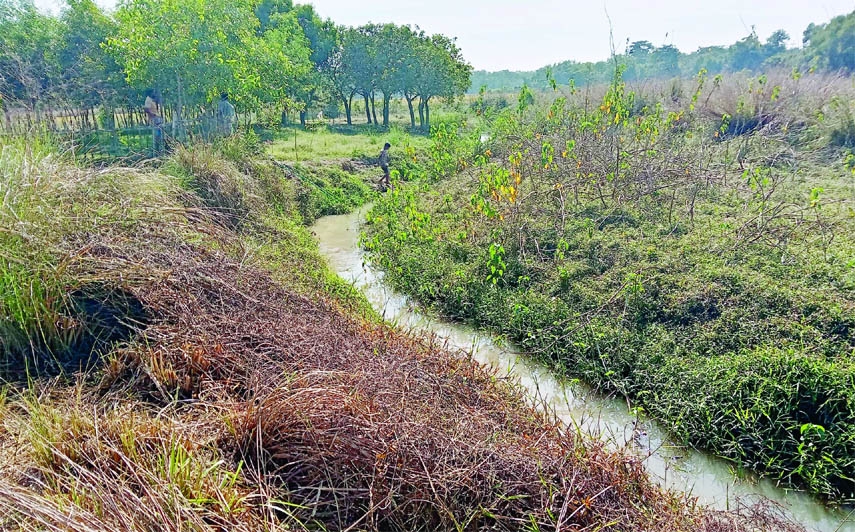
Moulvibazar Correspondent :
Large numbers of native fishes and guest birds’ sanctuary were in the winter season in Dewchhara waterbody in Kamalganj Upazila of Moulvibazar.
During the winter season, different species of native birds, including thousands of guest birds, roamed here for a long time. However, due to the bushes and silt, the water is becoming depleted as the reservoir is filled and compressed. On the other hand, poachers are active with net and poison traps. Some are fishing in the Beel by violating rules. As a result, no guest bird has come here in the last two years. Locals have long demanded digging of the canal. Joynal Mia, a resident of the area said, starts buzzing with the chirping of migratory birds at the beginning of winter every year. Although there are many more ponds and open spaces in the vicinity, the migratory birds flock to the Beel. Sometimes they fly in the sky in groups, and sometimes they float in the water of the lake filled with water lilies.
He said the number of birds on Beel is slowly declining last six years. Last two years, the number of migratory birds is not coming as any fish in the Beel. Lots of native fish were also found. At present the herbs are frozen and full and now there is no water so Beel is full, the duck doesn’t come anymore.
Muhibur Rahman, a farmer from Dhupatila Village near the Dewchhara Beel, said, thousands of guest birds flock to the waterbody in winter every year. We used to wake up in the morning with the chirping of birds. From time immemorial, there have been various species of birds including ducks and hawks.
This time the birds have not arrived and there are no available Padda, Shapla and grass on the Beel. All are rotten. Without these, birds are facing food crisis. Maybe this is why the birds have come down less in the Beel.
He said, some poachers used nets and put poison traps. Some are fishing in the Beel by violating rules. So, guest birds are in fear and avoiding the Beel
He expresses concern saying may be many species extinct as the hunters used poison traps.
Nurul Muhaimin Milton, General Secretary of Bangladesh Poribesh Sanbadik Samitee in Moulvibazar Unit said, the BEel is about ten km long and thirty feet wide. Now it is eight to ten feet wide. Although it was five to seven feet deep, it is now two to three feet deep. Beel is created on about one hundred acres of land in that area. The rhyme originates from the Chatlapur hilly area of Kulaura upazila and falls into the Laghata River. He said as a resident of the area, Beels and ponds, known as the habitat of mineral resources, aquatic animals including fish and guest birds, are now in dire straits. It is full of bushes and herbs.
The miserable condition of the Beel is causing irreparable damage to local agriculture, aquatic life and biodiversity, said Durud Ali, a social worker from Keshuluti village.
Jubel Ahmed, General Secretary of Dakshin Dhupatila Fishermen’s Cooperative Society Ltd said, due to the shortage of water, birds do not come, agriculture and fishing are disappearing. Locals demanded for digging water bodies.
Kamalganj Upazila Fisheries Officer Siddiqur Rahman said, I have heard that this place is a wonderful place for birds and fish. Bird and fish habitats can be increased by renovating and excavating the Dewchhara Beel. Proposals have already been sent to higher authorities for its excavation.
However, the former assistant forest conservator of the department (currently employed at Gazipur Bangabandhu Safari Park in-charge and Assistant Forest Conservator) Tabibur Rahman told this correspondent, thousands of guest birds have been spotted at that place. This place is a habitat for guest birds. In the past, many nets have been recovered from the bird hunters. The place needs renovation.

